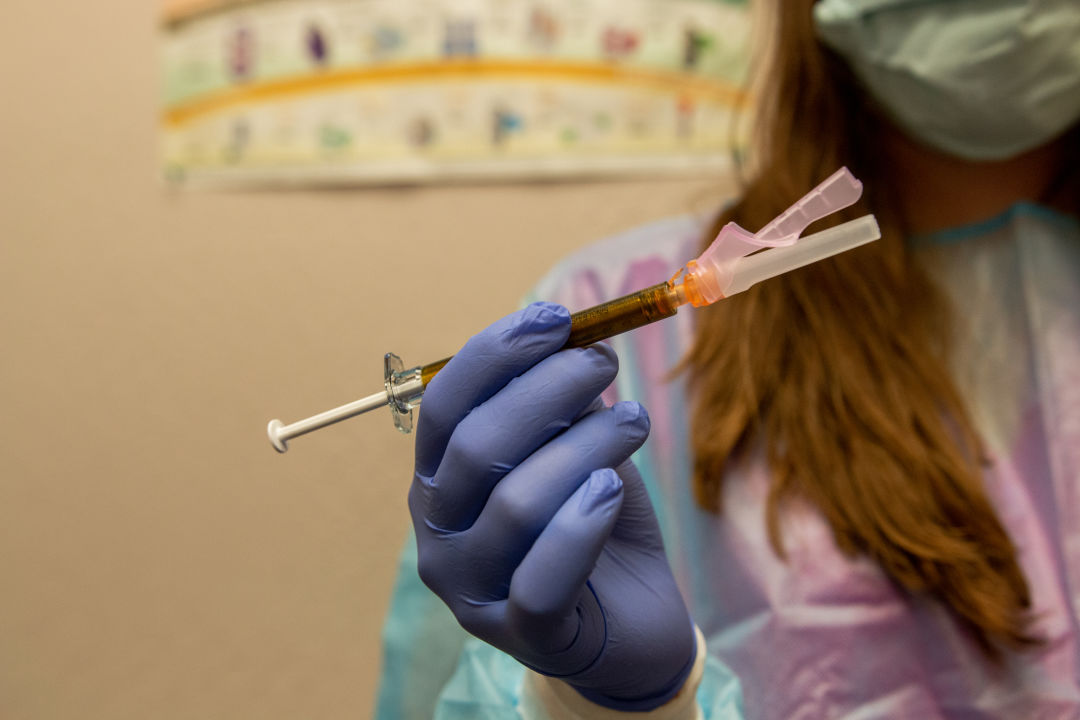Oregon's Vaccine Rollout Faces More Hiccups, Closes Phase 1A Survey

Due to limited vaccine supply, public health officials from Multnomah, Washington, and Clackamas counties announced they have closed the regional COVID-19 Phase 1A vaccination sign-up survey.
Image: Gabriel Granillo
Oregon’s vaccine rollout has been anything but smooth. Earlier this month Gov. Kate Brown revealed that some states, including Oregon, would not receive increased shipments of the coronavirus vaccine from the national stockpile because there was no federal reserve of doses, in what she called “deception on a national scale.” The lack of vaccine doses effectively pushed back Oregon’s vaccinations efforts.
And now, due to that limited vaccine supply, public health officials from Multnomah, Washington, and Clackamas counties announced they have closed the regional COVID-19 Phase 1A vaccination sign-up survey.
More than 60,000 eligible people had applied for vaccines through the survey, and more than 11,000 were sent invitations to be vaccinated, but with limited vaccine supply some will not get an appointment or receive their first dose for weeks. Others may have to wait months, according to a press release. Health systems in the Metro area are continuing to vaccinate the highest priority people in Phase 1A, "But the number who will be vaccinated in the short-term is very limited," according to the release. The release also indicated that the state reserved 12,000 vaccines for educators in the Metro area this week and just 3,000 doses for those remaining in Phase 1A.
“We want to emphasize that there are still tens of thousands of people in Phase 1A in the Metro counties who have not received their first dose of vaccine and who should be prepared to wait weeks, if not months,’’ Multnomah County Public Health Director Jessica Guernsey said. “We understand people are frustrated and we share their frustration. There is not enough vaccine to vaccinate everyone who is eligible or for everyone who has filled out our survey.”
In a press conference on Tuesday, public health officials from the tri-county area spoke about the difficulties they’ve faced during Oregon’s vaccine rollout, emphasizing challenges such as vaccinating the large metro-area population size, working with numerous health systems across the region, and working with the limited vaccine supply.
Washington County Health Officer Dr. Christina Baumann said that because of shifting policies, “timeliness is not going to be plausible for [the 1A group].” Baumann said despite the challenges, she is encouraged by the cooperation between health systems to roll out Oregon’s rocky vaccination plan, which has recently come under criticism.
Brown has said she wants as many schools as possible to resume in-person learning by mid-February. In order to do this, Oregon’s vaccination plan prioritizes school employees and, in effect, moves them up the line in front of the elderly, folks with pre-existing conditions, and non-medical essential workers. Much of that latter group includes members of Oregon's BIPOC communities, who have been particularly hard hit in this pandemic.
Brown’s move to prioritize teachers contradicts the Center for Disease Control guidelines which recommends vaccinating older people, people with pre-existing health conditions, and people at a very high risk of exposure first. The move has led some, even members of the state’s own Vaccination Advisory Committee, to question the governor’s plans.
Regional health officer Jennifer Vines said there are two ways to think about prioritization with regard to vaccine distribution: function and risk, and that the governor has chosen to focus on function. Despite the controversy surrounding the vaccine rollout, Vines said the "wheels are turning” to get educators their vaccinations per Brown’s decision. “To my knowledge we don’t have any plans to formally request that the governor pause her phasing plan,” she said. “We are just eager to see vaccine rollout go smoothly.”




